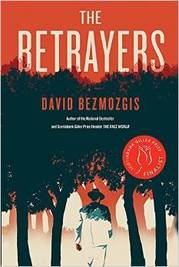
Reading this novel helped me better understand the politics of the Crimea (although not enough to articulate that understanding here), the Zionist position on the occupied territories, also explored, more humorously, in The Hilltop (although not enough to prevent me sympathising with the Palestinians) and the culture of expatriate Russian Jews I encountered earlier in A Replacement Life. It also raises the unanswerable question of whether the experience of cruelty is somehow cancelled out if it results in a positive outcome (as Kotler’s years in the gulag have been rewarded with a seat in government and won him the heart of an attractive young woman). A novel of ideas with sufficient story not to get bogged down in philosophising, The Betrayers is published by Viking Penguin who provided my review copy.
While migration is not integral to my own heritage, I seem to be drawn to novels on this theme (for example The Spicebox Letters, Academy Street, The Book of Strange New Things, A Place Called Winter). I imagine there’s a connection in the sense of otherness felt by many writers and, I suppose anyone growing up with an insecure attachment base. So the latest call to Rough Writers for 99-word stories on migration wasn’t too difficult to answer. Tangential to the current European crisis, Charli asks us to focus on the interaction between cultures, how migrants adapt to the mores of their hosts and vice versa. My flash is much lighter than my last one, a tribute to the vibrant multicultural city featured in The Zoo and partly inspired by my once feeble attempts to entertain a visitor from Nepal:
Swelling with pride, I presented my proposals. This was how I’d prove myself to those who considered me too young for the job. I’d produced a cracking itinerary for our overseas guests: a day at the gymkhana with an evening at the Mela on the Golden Mile. All I needed was the committee’s go-ahead to book a table at Kayal’s.
The chairman coughed. “It’s supposed to showcase Leicester’s best.”
“And?”
“And our English culture.”
“What’s more English than chicken tikka masala?”
“But our visitors are from India, remember. Don’t you think they’d prefer something they can’t get at home?”
I hope this works for readers from outside Britain. (Note, just as Jamie Mollart did in his novel, I’ve used poetic licence in featuring a real restaurant – I always go for the vegetarian option but I don’t think they serve chicken tikka masala at Kayal’s.)





















 RSS Feed
RSS Feed





















